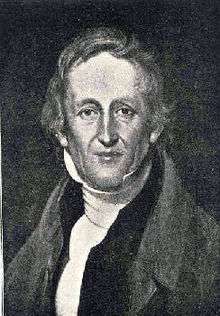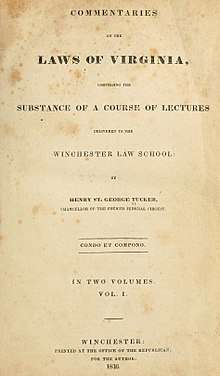Winchester Law School
Winchester Law School was a privately run institution for legal education. Operated by Henry St. George Tucker, Sr., it was open from 1824 to 1831.

History

In 1824 Henry Tucker was named Chancellor of the Equity Court of the Fourth District, with jurisdiction in Clarksburg and Winchester. Since he had left the Virginia State Senate and a lucrative law practice to accept the judicial appointment, he needed to generate additional income. Because he had previously worked as a law professor, Tucker decided to start a law school using a building at what is now 37 South Cameron Streer in Winchester.[1][2]
Using his father St. George Tucker's copies of Blackstone's Commentaries as the basis for his instruction, Henry Tucker lectured three days each week and gave his students regular quizzes to test their knowledge. In addition, he prepared, edited and published Tucker's Notes on Blackstone's Commentaries for the Use of Students. Tucker's Commentaries provided the current state and federal law on each point covered by Blackstone, and was widely used because it focused on United States common law rather than English legal and political theory.[3]
The Winchester Law School was a success, largely because of Tucker's favorable reputation as an attorney and law professor. He had 11 students in the 1824 to 1825 session, and the student body steadily increased until he had over 30 students each term.[4][5][6]
Closing
In 1831 Tucker was elected to the Virginia Court of Appeals. This position required him to relocate to Richmond and necessitated the closing of the Winchester Law School.[7]
Notable alumni
- John White Brockenbrough, federal judge and founder of the Washington and Lee University School of Law[8]
- William B. Campbell, member of the United States House of Representatives and Governor of Tennessee[9]
- John R. Chambliss, Sr., wealthy Virginia attorney, planter and member of the Confederate Congress[10]
- Robert M. T. Hunter, Speaker of the House, United States Senator from Virginia and Confederate States Secretary of State[11]
- William L. Goggin, member of the United States House of Representatives from Virginia[12]
- Zaccheus Collins Lee, attorney and judge in Maryland[13]
- Isaac S. Pennybacker, United States Senator from Virginia[14]
- Henry A. Wise, Governor of Virginia[15]
References
- William Hamilton Bryson, Legal Education in Virginia, 1779-1979, 1982, page 39
- "37 S. Cameron St". Stewart Bell Jr. Archives. Winchester, VA: Handley Regional Library. Retrieved January 30, 2016.
Location of Winchester Law School 1824 - 1831. Photo appears in "A Factual History of Education in Winchester Virginia" by Brant R. Harper, 1944.
- William Hamilton Bryson, Virginia Law Books: Essays and Bibliographies, Volume 239, 2000, pages 345 to 347
- Steve Sheppard, The History of Legal Education in the United States, Volume 1, 2007, page 413
- Virginia State Bar Association, Proceedings of the Annual Meeting of the Virginia State Bar Association, Volume 50, 1939, page 169
- Samuel C. Mitchell, Editor, The South in the Building of the Nation, 2002, page 338
- William Hamilton Bryson, Essays on Legal Education in Nineteenth Century Virginia, 1998, page 43
- "John White Brockenbrough". Washington and Lee University School of Law. Retrieved 27 December 2012.
- "William B. Campbell". Biographical Directory of the United States Congress. Retrieved 27 December 2012.
- Ezra J. Warner, Jr., W. Buck Yearns, Biographical Register of the Confederate Congress, 1975, page 45
- Martha T. Hunter, L. Quinton Washington, A Memoir of Robert M.T. Hunter, 1903, page 35
- "William L. Goggin". Biographical Directory of the United States Congress. Retrieved 27 December 2012.
- Lee Family Digital Archive, Washington and Lee University, Z. Collins Lee Attends Edgar Allan Poe's Funeral, April 17, 2011
- "Isaac S. Pennybacker". National Governors Association. Retrieved 27 December 2012.
- "Henry A. Wise". Biographical Directory of the United States Congress. Retrieved 27 December 2012.